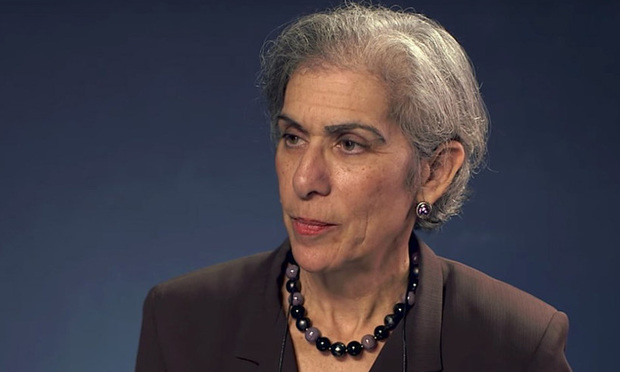Penn Law Prof Reassigned Over Race Comments
Penn Law Dean Ted Ruger said professor Amy Wax violated the school's confidentiality policy around grades and that black law students assigned to her required first-year courses would face undue pressures.
March 14, 2018 at 02:20 PM
4 minute read
 Amy Wax.
Amy Wax.
University of Pennsylvania Law School professor Amy Wax will no longer teach required first-year courses after a video recorded last year recently resurfaced in which she claimed black law students at Penn underperform academically.
Law Dean Ted Ruger informed law students in an email Tuesday evening that he had decided that Wax will teach only elective courses next year. (She has previously taught civil procedure in addition to upper-level courses.) Ruger said the move was not an attack on Wax's academic freedom, but a bid to ensure black law students don't face undue pressures should they be assigned to a required course she teaches.
Reached Wednesday, Wax declined to comment on Ruger's decision.
Law students began lobbying for Wax's removal from required courses last fall, after she co-authored an op-ed in The Philadelphia Inquirer that many found to be racist. The piece argued that a breakdown of cultural norms from the 1950 and 1960s has weakened the Unites States, and it singled out the “rap culture of inner-city blacks” and the growing “anti-assimilation ideas” among Hispanic immigrants as examples of negative trends.
But the law school took no formal action until this week, after a video interview Wax recorded last September with Brown University economics professor Glenn Loury circulated widely.
While explaining what she views as the “downside of affirmative action,” Wax claimed that black Penn law students nearly always land low in the class rank.
“I don't think I've ever seen a black student graduate in the top quarter of the class, and rarely rarely in the top half,” she said. “I can think of one or two students who scored in the top half in my required first-year course. What are we supposed to do about that? You're putting in front of this person a real uphill battle.”
Wax also claimed that Penn's law review has a racial diversity mandate, which Ruger refuted along with Wax's claim that black students struggle academically at the law school.
“And contrary to any suggestion otherwise, black students at Penn Law are extremely successful, both inside and outside the classroom, in the job market, and in their careers,” Ruger wrote in his email to students.
Ruger said Wax's comments to Loury ran afoul of a confidentiality policy surrounding grades. Additionally, he said black law students assigned to her required classes may believe that their professor has preconceived notions of how they will perform, thus facing added pressure to succeed.
“They may legitimately question whether the inaccurate and belittling statements she has made may adversely affect their learning environment and career prospects,” Ruger wrote. “These students may also reasonably feel an additional and unwarranted burden to perform well, so that their performance not be used or misused by their professor in public discourse about racial inequality in academic success.”
Ruger said that he was exercising his authority as dean to allocate courses, and that Wax has not faced any official sanction for her comments. She remains free to express her views, he said.
But Loury, the Brown University professor who made the controversial video with Wax, called Wax's course reassignment “Orwellian” in an email to Wax, which he forwarded when asked for comment on the situation Wednesday. Ruger is using the school's grade confidentiality policy as an excuse to not provide any facts to refute Wax's assertions about the academic performance of black students, wrote Loury, who is black.
“Moreover, you are said to be abusing your privileges as professor and to be using black students as guinea pigs for your research simply by commenting on their relatively poor academic performance—which is clearly a tendentious stretch by your dean intended to discredit you and to justify his reprehensible actions,” he added.
But a student petition calling on Ruger to take action and publicly refute Wax's claims argues that she should be removed from the school's clerkship committee in addition to a permanent removal from teaching first-year courses.
“Professor Wax's public statements are false, denigrating, and completely incongruous with Penn Law's culture and values,” it reads. “In order to separate itself from such harmful, hurtful lies, Penn Law must respond publicly.”
This content has been archived. It is available through our partners, LexisNexis® and Bloomberg Law.
To view this content, please continue to their sites.
Not a Lexis Subscriber?
Subscribe Now
Not a Bloomberg Law Subscriber?
Subscribe Now
NOT FOR REPRINT
© 2025 ALM Global, LLC, All Rights Reserved. Request academic re-use from www.copyright.com. All other uses, submit a request to [email protected]. For more information visit Asset & Logo Licensing.
You Might Like
View All
Sanctioned Penn Law Professor Amy Wax Sues University, Alleging Discrimination
5 minute read
Pa. Superior Court: Sorority's Interview Notes Not Shielded From Discovery in Lawsuit Over Student's Death
3 minute read
LSAT Administrator Sues to Block AI Tutor From Using ‘Famous, Distinctive’ Test Prep Materials
3 minute read
Disjunctive 'Severe or Pervasive' Standard Applies to Discrimination Claims Against University, Judge Rules
5 minute readTrending Stories
Who Got The Work
J. Brugh Lower of Gibbons has entered an appearance for industrial equipment supplier Devco Corporation in a pending trademark infringement lawsuit. The suit, accusing the defendant of selling knock-off Graco products, was filed Dec. 18 in New Jersey District Court by Rivkin Radler on behalf of Graco Inc. and Graco Minnesota. The case, assigned to U.S. District Judge Zahid N. Quraishi, is 3:24-cv-11294, Graco Inc. et al v. Devco Corporation.
Who Got The Work
Rebecca Maller-Stein and Kent A. Yalowitz of Arnold & Porter Kaye Scholer have entered their appearances for Hanaco Venture Capital and its executives, Lior Prosor and David Frankel, in a pending securities lawsuit. The action, filed on Dec. 24 in New York Southern District Court by Zell, Aron & Co. on behalf of Goldeneye Advisors, accuses the defendants of negligently and fraudulently managing the plaintiff's $1 million investment. The case, assigned to U.S. District Judge Vernon S. Broderick, is 1:24-cv-09918, Goldeneye Advisors, LLC v. Hanaco Venture Capital, Ltd. et al.
Who Got The Work
Attorneys from A&O Shearman has stepped in as defense counsel for Toronto-Dominion Bank and other defendants in a pending securities class action. The suit, filed Dec. 11 in New York Southern District Court by Bleichmar Fonti & Auld, accuses the defendants of concealing the bank's 'pervasive' deficiencies in regards to its compliance with the Bank Secrecy Act and the quality of its anti-money laundering controls. The case, assigned to U.S. District Judge Arun Subramanian, is 1:24-cv-09445, Gonzalez v. The Toronto-Dominion Bank et al.
Who Got The Work
Crown Castle International, a Pennsylvania company providing shared communications infrastructure, has turned to Luke D. Wolf of Gordon Rees Scully Mansukhani to fend off a pending breach-of-contract lawsuit. The court action, filed Nov. 25 in Michigan Eastern District Court by Hooper Hathaway PC on behalf of The Town Residences LLC, accuses Crown Castle of failing to transfer approximately $30,000 in utility payments from T-Mobile in breach of a roof-top lease and assignment agreement. The case, assigned to U.S. District Judge Susan K. Declercq, is 2:24-cv-13131, The Town Residences LLC v. T-Mobile US, Inc. et al.
Who Got The Work
Wilfred P. Coronato and Daniel M. Schwartz of McCarter & English have stepped in as defense counsel to Electrolux Home Products Inc. in a pending product liability lawsuit. The court action, filed Nov. 26 in New York Eastern District Court by Poulos Lopiccolo PC and Nagel Rice LLP on behalf of David Stern, alleges that the defendant's refrigerators’ drawers and shelving repeatedly break and fall apart within months after purchase. The case, assigned to U.S. District Judge Joan M. Azrack, is 2:24-cv-08204, Stern v. Electrolux Home Products, Inc.
Featured Firms
Law Offices of Gary Martin Hays & Associates, P.C.
(470) 294-1674
Law Offices of Mark E. Salomone
(857) 444-6468
Smith & Hassler
(713) 739-1250





